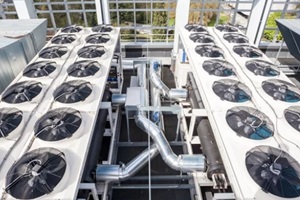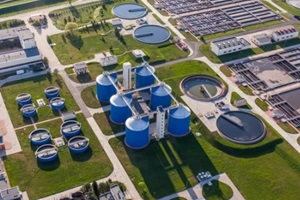 HVAC systems play a crucial role in maintaining indoor air quality and energy efficiency in buildings. Proper water treatment services for boiler and cooling tower systems are essential for maintaining optimal operating conditions, especially in places like New Jersey.
HVAC systems play a crucial role in maintaining indoor air quality and energy efficiency in buildings. Proper water treatment services for boiler and cooling tower systems are essential for maintaining optimal operating conditions, especially in places like New Jersey.
Neglecting HVAC water treatment can lead to severe consequences, including health risks, increased operational costs, and even potential system failures if left untreated for an extended period. Partnering with the right water treatment companies can help ensure your HVAC system operates at peak performance, saving money and prolonging the lifespan of your equipment.
This article will delve into the benefits of regular maintenance and the risks of ignoring it, providing you with the knowledge you need to keep your building’s atmosphere healthy, efficient, and cost-effective for years to come.
Why HVAC Water Treatment Services Are Important
In New Jersey, HVAC water treatment services are essential for maintaining the health, safety, and efficiency of commercial and industrial buildings. The state’s unique water conditions, characterized by high mineral content and potential contaminants, can pose significant challenges for HVAC systems if left untreated.
Proper water treatment helps prevent issues like corrosion, scale buildup, and biological growth, which can lead to system inefficiencies, increased maintenance costs, and potential health hazards.
Energy Efficiency
One of the primary benefits of proper HVAC water treatment is improved energy efficiency. When your system’s water is treated to control corrosion, scale, and biological growth, it can operate at optimal efficiency, reducing energy consumption and utility costs. In New Jersey, where energy rates can be high, maximizing your HVAC system’s efficiency through effective water treatment can result in significant savings over time.
Safety For Those Surrounding Your Building
Properly treating your HVAC water system is crucial for protecting the health and safety of your building’s occupants. Untreated water can harbor harmful bacteria, such as Legionella, which can cause serious illness.
In New Jersey, where high humidity levels can create ideal conditions for bacterial growth, and where the population is dense, the risk of Legionella proliferation in untreated HVAC systems is a significant concern.
Legionella and other harmful bacteria can become aerosolized and spread through the air when contaminated water from untreated HVAC systems, such as cooling towers, evaporates and releases fine water droplets. These contaminated water droplets can then be inhaled by building occupants, potentially leading to serious respiratory illnesses like Legionnaires’ disease.
Overall Maintenance Of Your System
 To maintain optimal performance and longevity of your boilers and cooling towers, investing in regular water treatment is essential. A comprehensive treatment program tailored to each system is crucial for protecting against the damaging effects of corrosion, scale buildup, biological growth, and debris accumulation, especially in New Jersey’s challenging water conditions.
To maintain optimal performance and longevity of your boilers and cooling towers, investing in regular water treatment is essential. A comprehensive treatment program tailored to each system is crucial for protecting against the damaging effects of corrosion, scale buildup, biological growth, and debris accumulation, especially in New Jersey’s challenging water conditions.
In boilers, corrosion occurs when dissolved oxygen and carbon dioxide in the water react with metal surfaces, leading to pitting, leaks, and potential failures. Proper corrosion inhibitors are vital for forming a protective oxide layer on boiler surfaces.
In cooling towers, corrosion is caused by dissolved minerals and gasses attacking metal components like fill material and piping. Corrosion inhibitors prevent this deterioration by creating a barrier between the water and metal.
Boilers are highly susceptible to scale buildup from hardness minerals like calcium and magnesium. As water is heated, these minerals precipitate out, forming insulating deposits on heat transfer surfaces that reduce efficiency and can lead to overheating and failure.
Scale inhibitors and blowdown/bleed-off control are key for boilers. Cooling towers can also experience scale issues, particularly on fill material and in distribution piping. However, the lower operating temperatures make scale somewhat less problematic compared to boilers.
Bacterial growth, including Legionella, is a major concern in cooling towers due to their open-loop design and warm, aerated conditions ideal for microorganisms. Biocides and biodispersants are critical for controlling biofilm formation on tower surfaces.
In closed-loop boiler systems, biological growth is less of an issue but can still occur, making biocide treatment an important part of a comprehensive boiler water treatment program. Annual cleanings are recommended for both boilers and cooling towers to remove accumulated sludge, scale, and other debris that impairs performance.
Boilers may require cleaning 1-2 times per year, often during scheduled outages, using specialized methods or chemical cleaners. Cooling towers typically need more frequent cleaning, such as biannually, to remove built-up scale, biofilm, dirt/dust, and other contaminants from basins, fill material, and distribution decks using pressure washing or chemical descalers.
What Are The Risks of Neglecting Water Treatment?
 While proper HVAC water treatment is crucial, many facilities in New Jersey may underestimate the significant risks of neglecting this critical maintenance aspect. Increased energy costs due to system inefficiencies, higher repair expenses from equipment damage, potential health hazards like Legionnaires’ disease, and reduced equipment lifespan necessitating premature replacements are all consequences of neglecting water treatment.
While proper HVAC water treatment is crucial, many facilities in New Jersey may underestimate the significant risks of neglecting this critical maintenance aspect. Increased energy costs due to system inefficiencies, higher repair expenses from equipment damage, potential health hazards like Legionnaires’ disease, and reduced equipment lifespan necessitating premature replacements are all consequences of neglecting water treatment.
New Jersey’s challenging water conditions with high mineral content exacerbate these risks. Raising awareness of these substantial risks highlights the importance of implementing a comprehensive water treatment program – a proactive approach to protect your building or facility’s investments.
Work With Tower Water For Your Water Treatment System
Clearly, the overall health of your HVAC system hinges on diligent water treatment processes being employed year round. From preventing scale and corrosion to safeguarding against microbiological threats, the benefits of maintaining your system cannot be overstated. Ensuring that your system is properly treated can enhance its efficiency, extend its lifespan, and also protect the health of those in and around your building.
If you’re ready to take the next step in protecting your investment and ensuring your system operates at its peak, Tower Water offers access to premier water treatment services and solutions to ensure safe water for your HVAC systems. Discover how we can help you today.
